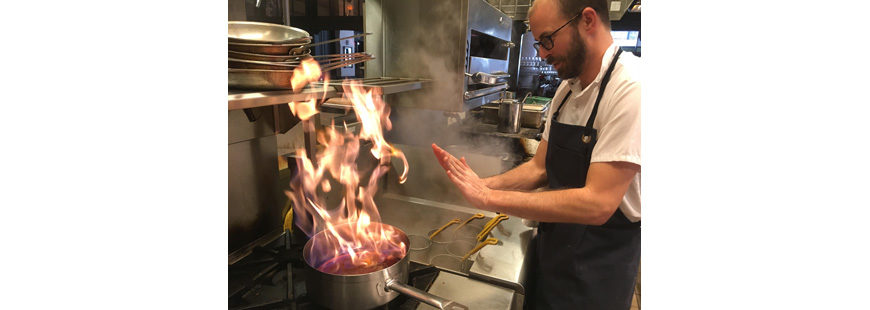If I asked you to name a famous chef or five, you could probably rattle them off without thinking much about it. You would not be able to name a famous line cook, which is not your fault, because there are none.
So I feel like I need to introduce myself. My name is Kendall, and I’m a professional line cook.
I am often hidden from view in the back of the house, but I am there cooking your dinner. I have missed Christmases, Thanksgivings, and–even worse–Mardis Gras to devote my life to a career in food. Although I have a postgraduate degree, I choose to work in restaurants because I believe cooking is a solution to many of the world’s public health and environmental problems that I see as existential. I know I invite accusations of naïveté and pretension, but I truly believe restaurant cooking at its best can inspire and inform the rest of us to treat our bodies and planet in a more thoughtful and healthy way.
Would we all know about the benefits of organic agriculture and pastured eggs and local seafood if Chez Panisse had never existed? It’s possible, but Chez Panisse’s influential chefs, Alice Waters and Jeremiah Tower, certainly helped bring the conversation to mainstream audiences.
Chefs might be guiding these conversations, but they are often not the ones cooking your food on any given night. They have cooked for you in the past and are more than capable of cooking for you now. But they are often doing things that are better uses of their time, like writing menus, developing relationships with purveyors, or paying the restaurant’s bills. If they are more successful and ambitious, they may go between multiple restaurants and make public appearances to help promote the business and make sure all of the servers, hosts, cooks and dishwashers who rely on them for paychecks have a stable place to work.
The poor conditions of restaurant work are well documented, but I will tell my own story. I literally break my back for $13 an hour with no insurance, paid vacation, or sick leave. I am among the better paid cooks in New Orleans. This is why I–and many other cooks I have conversed with–take it personally when accusations of elitism are thrown at our industry.
In a recent article in a trade publication, Jeff Angers, president of the Center for Sportfishing Policy, said it was “utter folly to think that chefs are interested in conservation.” He followed with, “The last people on Earth that I would go to for guidance on fisheries management are chefs and fancy restaurateurs in New Orleans.”
This is from an individual whose organization represents a group of wealthy anglers who have the means to own expensive boats that can reach the deeper waters in which to fish the Gulf of Mexico. Further, his organization spent more than $350 million dollars on lobbying and campaign contributions in the last election cycle.
For chefs who are using their platforms to advocate for the long-term health of wild-caught fish, this is not about making money. For them, serving higher quality seafood almost always leads to a higher food cost percentage because there’s a ceiling on what customers are willing to pay for dinner. That means thinner margins.
If you think “fancier restaurants” are more profitable than restaurants serving cheap, farmed fish, you would be sorely mistaken. I am aware of no documented correlation between price point and profitability, but anecdotally I would offer that I have worked for James Beard nominees and winners who drive modest cars and rent their homes.
When chefs say that they support the science-based conservation measures of the Magnuson-Stevens Act, it’s because they want to serve the best product. Farm-raised and imported fish are inferior in every way but price to wild-caught fish.
Chefs interact with multiple species of fish everyday, so they can see changes to the size and health of the stocks in real time, not just when they are on the water for recreation. They have seen collapses before and are motivated by their desire to have fish to serve in the future, or in many cases, by their own consciences. They are some of the first people we should be looking to for fisheries advice.
Tourism is essential to the New Orleans economy. Some of the tourists come here to fish, but nearly every visitor will eat in a local restaurant at some point. Part of the attraction is that we are telling a story about the traditions and culture of a unique place.
The profit margins on restaurants are already so thin that a slight drop in tourism could have significant implications on the industry. When a restaurant closes, it’s not just the chef/owner who takes the hit. All of the low-wage workers who already live paycheck-to-paycheck are at risk of missing a monthly payment and losing their housing, transportation, or healthcare.
As a low-wage worker whose industry relies on healthy fish stocks, there is a lot at stake for me in the MSA reauthorization process, but wealth is not part of the equation. If H.R. 200 and S. 1520 are killed or miraculously rewritten to maintain or improve conservation, I will still be making a fraction of the average boat owner.
Reasonable minds can disagree on how to manage fisheries, but ad hominem attacks against chefs are baseless, ignorant, and offensive.



Thank you, Kendall. Props to you for all you are doing in the fight for long term solutions to manage our fisheries.